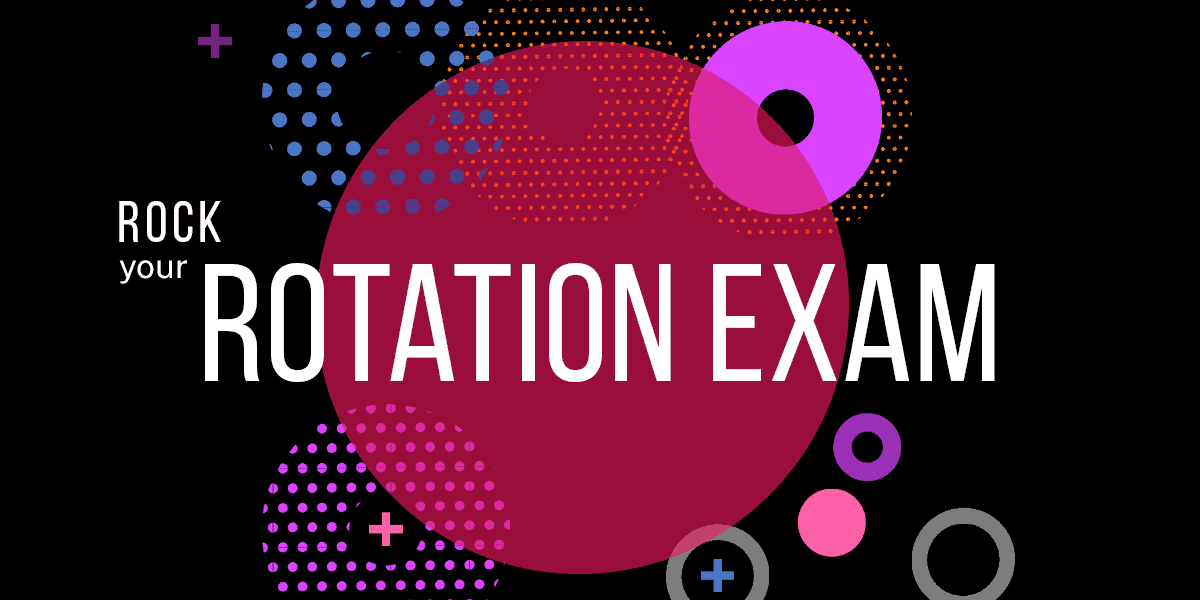PAEA End of Rotation™ Exams can be grueling and intimidating, but with the right tools and techniques, there’s no need to worry! You can use many study techniques and habits to be successful and confident when taking your exams. Visual, auditory, kinesthetic—different learning styles are better for each learner, and it is important to adapt to ones that work for you.
In PA school, rotation exams test your knowledge of specific rotations. The test is an objective measure to ensure you are learning and able to apply the knowledge you gained throughout your clinical experiences. Each rotation and specialty has nuances regarding certain patient populations, so it is important to retain as much information as possible. I used these tips and tricks during my rotations to help me process information and continue with good study habits.
Remember what’s worked in the past
First and foremost, recognize your study habits and what has previously worked for you. Do you work best in a coffee shop or library? Is reading the optimal way for you to learn, or do you prefer visual or auditory sources? Although you can transfer your past PA exam study habits to your rotation exams, additional tools that you didn’t need for didactic year might be useful. During didactic year, there is a mountain of information toppling over you. Yes, the “medical/PA school is like drinking water out of a fire hose” analogy is applicable here. For your rotation exams, the details are more refined. Make sure to focus on the information pertinent to your current rotation; don’t spend time studying women’s health when you’re working in emergency medicine.
For rotation exams, you must study throughout your clinical experience rather than saving it for the last minute. Just like any other PA exam, repetition and frequent exposure to the material is the only way for it to stick and make sense. Remember, be proactive, not reactive!
Take notes during clinical rotations
For me, note-taking helps the material stick in my brain. Throughout my day during rotations, I jotted down specific tips and clinical pearls that I learned from my preceptor. That evening, I went through these notes while researching the topics in textbooks and online resources. Then, I created questions for myself based on these notes and attempted to answer them later. This helped take away some test-taking anxiety on the rotation exams because I had spent time creating my own exams and became more comfortable taking tests.
Studies show that hand-written notes are a much more effective method for learning new material than typing your notes. You are forced to condense information, challenging you to be more of an active listener and write down what is most important. When we take notes on a laptop or tablet, we focus on getting all of the information down verbatim and lose sight of the topic. Instead of typing your notes, try to use a paper and pen. Yes, this seems barbaric, but I promise it will help the information stick and you will end up writing down more pertinent details.
Recall specific patient encounters
At the end of each day in your clinical rotations, go home and review the patients you saw that day. What diseases did you see and how did they clinically manifest? How were they treated? What type of preventative health measures were discussed with patients regarding their age and sex? Remember, it’s important to incorporate your medical knowledge with actual application and clinical experience. These patient encounters will help you remember the disease process and how it was treated. If I saw something that manifested clinically like a textbook diagnosis, I put a mental picture in my head. Come exam time, these encounters came to the forefront of my memory and I was quick to answer the question correctly.
Listen to podcasts
You may have long commutes for some rotations. Utilize this time to listen to lectures and podcasts.
- Physician Assistant Exam Review
This free podcast by Brian Wallace, PA-C, goes over topics covered on the PANCE/PANRE blueprint. Prioritize diseases that are specific to your current rotation. Brian only gives the information you need rather than the specific details, which helps focus your studying. You can also supplement these podcasts with your hand-written notes to incorporate both visual and auditory learning methods.
Each episode begins with priming questions that challenge you to answer them before listening to the material. Brian then goes over the information that will ultimately answer those questions. At the end of the podcast, he asks the questions again and reviews the answers. This kind of repetition helps the information stick.
- ERCast with Dr. Rob Orman, and EMCrit with Dr. Scott Weingart
I used these podcasts during my emergency medicine rotation. The topics can be pretty in-depth and may exceed the material you need to know, but they’re full of great information, so use them on specific topics. The hosts are energetic, fun, and very informative. I recommend saving these podcasts to give you the “wow” factor with your preceptors and prepare you for those tough questions they’ll ask you on your EM rotation.
Read the right textbooks
While podcasts and auditory learning can be incredibly useful, textbooks and other reading materials are an important resource.
- Surgical Recall by Dr. Lorne Blackbourne.
I used this during my general surgery rotation and for some elective surgical rotations, and it was by far the most beneficial textbook. It is great for recalling surgical information, hence the title. It uses a Q&A format for common surgeries, making it easy to quiz yourself. This book will prepare you for those tough-to-answer questions that your surgeon will try to challenge you with. I vividly remember being asked about a Meckel diverticulum in the operating room, and thanks to this textbook, I answered the question immediately.
- PANCE Prep Pearls by Dwayne A. Williams
I also highly recommend this book, which is not only great for PANCE or PANRE review, but it is also helpful with reviewing topics for your rotation exams. The book is broken down into body systems using the PANCE/PANRE blueprint. Use this for condensed information and to review tough topics.
Additionally, any textbooks that you used for your didactic year will be an excellent study aid. Make sure to reference them and your old notes! I created single-sheet study materials for certain diseases processes that I had trouble remembering. This helps condense information and eliminates some of the excessive details that aren’t important for your exam.
Follow PAEA topic lists and blueprints
Make sure to look at each of the topic lists and blueprints for your specific rotation exam. You’ll see the breakdown of topics for each rotation exam—cardiology and pulmonology are the big guns! You will also find the percentages of how much each organ system is covered, and the percentage of question types that will be asked (history & physical, diagnostic studies, you get the idea). Use this as a checklist to look over the areas you’re proficient in, but especially note the topics you struggle with. This will help you focus your studies on material that needs more attention.
I created a schedule for myself, focusing on areas that I personally struggled with. Hematology and oncology were always tough topics for me in school, but the blueprint showed me that they weren’t the primary topics of the exam, so I didn’t need to spend hours studying this material. This will also help you focus your studies on frequently-asked topics.
Practice with Qbanks
The most crucial thing for me was using Rosh Review’s Boost Exams. When I was confident about how much I had studied for my rotation exam, I used these exams to practice. There are two modes: tutor mode and test mode. Tutor mode provides clinical information about each answer, while the test-taking mode mimics an exam and is timed. I assure you that these will help you feel confident when it’s time to take your rotation exams.
Take a break!
Rotation exams are important for your success in PA school, but you absolutely must take time for yourself. We focus on knowing each and every detail and spend countless hours studying, which is even more challenging during clinical rotations. Taking breaks is an important part of maintaining a healthy mind and spirit. Ultimately, this will lead to more effective studying, and you will retain information better. When your brain is exhausted from the clinic each day, coming home and studying right away is not the best option. Take a walk outside. Go for a run. Call someone you care about. Do something that will help you get your mind off the day and give you enough time to reset. Then, begin your studies. You’ll see a huge difference.
These study tools helped me pass my rotation exams. Best of luck, and remember, study the material so you can save your patient’s life, not just to pass an exam.
Learn more about Rosh Review’s Physician Assistant Qbanks.
Rock Your Rotation Exam series shares the experiences, insights, and perspectives of PA students preparing for their rotation exams. The goal of the series is to provide you with actionable information and key takeaways to help you not only prepare for, but to excel on your rotation exams.
Rosh Review, LLC is not sponsored or endorsed by, or affiliated with, the Physician Assistant Education Association (PAEA) or the End of Rotation™ Exam (EOR™). All trademarks are the property of their respective owners.
You may also be interested in these blogs:
How to Rock Your Clinical Rotations and End of Your Rotation Exams
The Exam Writer’s Strategy That Test Takers Don’t Know About (But Should)





